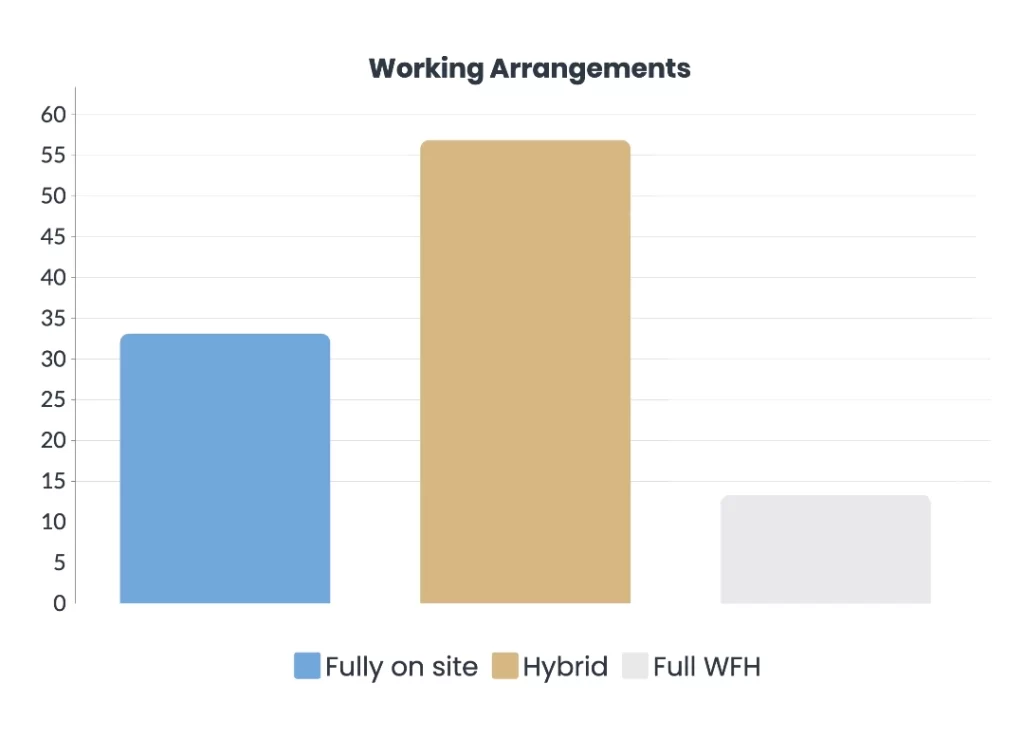
Introduction
The remote job market has boomed ever since the Covid-19 pandemic.
Remote jobs had been around for a while, but only in the last few years have they and the concept of dispersed working risen to fame.
As the dust has settled on this way of working, the way in which we approach work, our careers and finding new jobs has also taken a substantial shift.
If you’re applying for a remote job nowadays, there’s a high chance that your interview process will be carried out online.
That transition from face to face interviews to video conferencing is just one example of a change that requires a new way of thinking and approach; transitioning what we traditionally know about the job application process to a space where we need to ‘re-skill’ ourselves in how to be effective self-promoters.
As the remote job market has boomed, so has the competition for placements.
In this article we’ll explore not only the remote job application process, but the changing face of flexibility in the job market and the new opportunities that have opened up in this new age.
Key Takeaways
The Remote Work Landscape
The landscape of remote work is somewhat volatile at the moment.
On the one hand there’s a push for returns to the office, largely led by senior leadership and CEOs. Whereas the preference of employees is to strike a balance of both remote and in office working.
It’s coming to prevail that a hybrid work model looks most agreeable for most parties, where time is split between the office and home – combining the best aspects of both worlds.
Overview of Remote Job Market
According to WFH Research current job market arrangements amongst employees look like this, 31% fully on site, 57% hybrid, 12% fully remote.

With some of the best industries for remote work opportunities being those that lend themselves well to digitalizaiton:
- Technology
- Education
- Marketing & Advertising
- Customer Service
- Research & Data Analysis
- Creative
- Consulting
Interestingly, there is also a disparity when it comes to urbanized areas and remote work and rural locations.
Dr Fabian Brasemann, a lead author on a recent Oxford University remote work paper stated:
‘Working from anywhere is not a technical problem anymore, thanks to digitally enabled remote work. But it remains an economic-institutional one. The remote labour market is globally polarised between countries, between urban and rural areas within countries, and in particular, between job types. So, if you live in a cosmopolitan area of a developed country, you are much more likely to be employed through the digital platforms.’
For those looking to start a remote work career, there might be challenges in finding fully remote opportunities in remote areas.
As hybrid work is the most common setup, living within a commutable distance of a large city could be beneficial in opening up more doorways to a career that balances both remote work and the in office experience.
Types of Remote Jobs
When it comes to remote work structures, traditional 9-5 working has been reframed.
There are now a number of flexible options available for those looking to cater their working lives to suit their own personal needs including
- Part-time work
- Second jobs
- Summer work
- Online jobs for students
- Online jobs for teens
- Side hustles
- Overnight online jobs
- Digital nomadism
It’s worth keeping in mind that there are both pros and cons to each time of remote work setup.
Most offer great flexibility, work-life balance and autonomy, whereas on the flipside there can be concerns around job stability and the administrative side of managing your own income/business.
Side Hustles
For those looking to make some extra money from home or create a side hustle that can turn into a full-time business, there’s a plethora of options nowadays.
Some options include:
- Print on Demand
- Affiliate Marketing
- Freelance Writing
- Creating an Ebook
- Video Editing
- Online Tutoring
- Web Development
When starting a side hustle or your own business, it’s worth keeping in mind that you’ll be responsible for a number of things:
- Business Registration
- Tax Obligations
- Domain Name and Hosting/ Website Development
- Payment Processing.
- Legal Compliance
- Intellectual Property Protection
- Inventory Management (if applicable)
- Customer Service
- Financial Management
Along with giving you the freedom to manage your own time and income, creating your own business online is a fantastic option if you have an idea you can market and sell.
Make sure to undertake thorough market research beforehand to fully explore the opportunity.
Lots of online resources will have you believe you can make 10s of thousands of dollars within a month, but to set realistic expectations in most instances, you’ll need to set a longer timeline to hit substantial income.
Navigating Remote Job Platforms
Typing your job search into Google will leave you with a mass of sites claiming to list positions related to your query.
Sadly, there are a lot of scam job listings out there. To save yourself a lot of time and energy it’s worth knowing what sites are reputable with genuine job listings and what to look out for to avoid scammers.
Popular Remote Job Boards
Firstly, it’s good to know how to find remote jobs and which popular remote job sites are best to stick to for your particular requirement.
Here’s the top 10 list of legitimate remote job sites:
- FlexJobs: Known for its scam-free environment, variety of job types, and career services.
- We Work Remotely: Offers a broad selection of remote roles, particularly in tech.
- Remote.co: Stands out for its curation of remote jobs across various industries.
- Remote OK: High volume of tech-focused listings, including software development.
- Upwork: Ideal for freelance gigs with the flexibility of short-term contracts.
- Fiverr: Suitable for creative professionals seeking quick freelance work.
- Freelancer: Connects freelancers with projects, great for a diversity of skill sets.
- Dynamite Jobs: Updated regularly with new positions, excelling in startup opportunities.
- Indeed: A vast job board that aggregates listings, useful for its filtering tools.
- LinkedIn: Large global job platform with listings across all major industries.
To improve your chances of landing your ideal virtual job, make sure you cater your resume to match the requirements of the job description. Polish up your Linkedin profile too and link it from within your resume to affirm your identity and back-up your credentials.
Remote Job Companies
To ensure you land a remote job that fits your career aspirations and offers the best benefits that remote work has to offer, it can be worth your time researching the best remote companies to work for.
These companies have a varying amount of perks, particularly with a focus on work life balance. Be sure to look out for:
If you’ve got your sights set on working in tech for the biggest companies out there, these resources will give you all you need to know to help you land a job with them.
Freelancing and Gig Economy Platforms
One space that enables remote work, flexible scheduling and autonomy that’s seen a huge boom in recent years is freelancing gigs.
Sites like Fiverr and UpWork provide the ability to source work from anywhere in the world with high demand for skills such as copywriting, graphic design, web development, SEO, social media management amongst others.
Some top 3 pros of freelancing work are:
On the negative side there’s:
To build a successful freelance career you’ll need to have a marketable skill that people are willing to pay for. From there it’s a good idea to offer services at a lower rate to get business and build up a solid base of good reviews to win even more business. Having a strong portfolio of work you can make public also goes a long way to gaining business.
Crafting Your Remote Job Application
When applying for remote jobs, as well as taking time to perfect your resume, including remote work skills such as communication and digital knowledge can go a long way to convincing employers of your suitability.
Even if you’re staring out your career and you feel you lack the knowledge to land a role you can still find remote jobs with no experience
Resume and Cover Letter Tips
As with most applications, it’s always a good idea to cater your resume and cover letter to the job description.
Specifically for remote work applications it’s important to highlight soft skills which will make you an effective remote worker such as:
Addressing concerns that employers might have upfront and showing enthusiasm to learn are also a good way to put forward a strong application.
An effective job application follow up can also help you to stand out from the crowd and land a first interview.
Virtual Interviews and Assessments
Most remote job interviews are going to take place virtually. Knowing how to prepare for an online interview, including the differences between face to face and understanding how video conferencing software works are vital to put your best self forward.
This article on Zoom interview tips contains pointers on how to prepare for your interview over the commonly used platform.
You might want to emphasise and showcase some of the previously mentioned skills such as communication by speaking clearly and being concise, or give examples of how you’ve collaborated effectively as part of a dispersed team.
Besides that, traditional interview tips and best practices can still be applied.
Here’s a list of resources to help you through the process:
- Interview checklist
- Unique interview questions to ask an employer
- Common interview questions and how to answer them
- Questions to ask at the end of an interview
- How to follow up after an interview
Remote Work Lifestyle
If you’re new to remote working, the lifestyle and structuring your day might take a bit of getting used to.
There’s a lot more autonomy when working remotely. I struggled at first to manage my time effectively and partition work and my personal life to maintain a healthy work-life balance.
Work-Life Balance in Remote Jobs
If work-life balance is of high importance to you, this piece on the best work-life balance jobs might be a good place to start to ensure you find a position that gives you the flexibility you’re after.
Finding a good work-life balance is about trial and error and finding out what works for you when it comes to your daily activities and planning. It can take time to feel content and it’s not just down to the job we do, but also how we create a productive space where we can be productive and also relax when we need to.
If you’re in a job where you feel that you’re stressed or overworked and don’t have enough time to do things like spending time with family and enjoying your hobbies, then it could be a good time to move. If you can, take time to discuss with others who work remotely how they find their work-life balance is to see if there’s any chances you can make or whether the grass could in fact be greener on the other side!
Conclusion
I hope this article offers some useful insights into the remote job site and how to be successful.
Here’s a summary of the key points:
Thanks for reading!

James Waite
Founder of Remoteopia, James has worked in remote roles for 6 years. After a stint in recruitment, he now works as a director of website strategy in tech.





